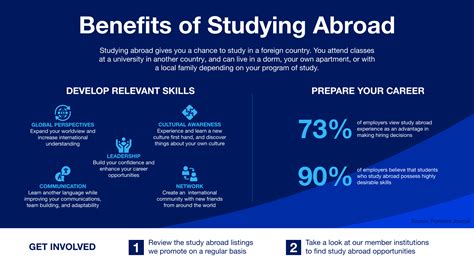Introduction

Embarking on a life-changing study abroad experience not only enriches your worldview but also significantly enhances your resume. By immersing yourself in a foreign culture, developing cross-cultural competencies, and acquiring new skills, you gain a competitive edge in today’s global job market.
Statistics and Quantifiable Benefits
According to the Institute of International Education (2020), approximately 54% of U.S. employers view study abroad as a valuable asset. Employers recognize that students who have studied abroad possess:
- Increased intercultural competence: 94% of hiring managers believe that intercultural communication skills are essential in the modern workplace.
- Enhanced problem-solving abilities: 83% of study abroad participants report improved problem-solving skills.
- Greater adaptability and resilience: 87% of study abroad alumni believe the experience enhanced their resilience and adaptability.
Highlighting Study Abroad on Your Resume
1. Skills Section:
- Intercultural Communication: Emphasize your ability to communicate effectively across cultures, including non-verbal cues and cultural norms.
- Cultural Sensitivity: Showcase your understanding and appreciation of diverse cultural perspectives.
- Adaptability and Resilience: Highlight your ability to navigate unfamiliar environments, manage stress, and thrive in challenging situations.
- Language Proficiency: Note any language proficiency gained or improved during your study abroad.
2. Education Section:
- Study Abroad Program: Include the name and location of the program, dates attended, and course of study.
- Academic Achievements: Mention any coursework, research, or projects that demonstrate your cross-cultural learning.
- Honors and Awards: Highlight any special recognition or awards received during your study abroad.
3. Experience Section:
- International Volunteering or Work Experience: Showcase any volunteering or work experience you gained abroad.
- Cultural Exchange Activities: Describe any opportunities you had to interact with local communities, attend cultural events, or participate in cultural exchange programs.
- Independent Projects: Highlight any independent projects or research you conducted that explored your host country’s language, culture, or politics.
Tips and Tricks for Maximizing Impact
- Quantify Your Experiences: Use specific numbers to demonstrate your impact, such as the number of hours spent volunteering or the countries you visited.
- Emphasize Your Motivation: Explain why you chose to study abroad and how it aligned with your career goals.
- Use Action Verbs: Use strong action verbs to describe your skills and accomplishments, such as “negotiated,” “collaborated,” or “analyzed.”
- Seek Feedback: Ask a mentor, career counselor, or friend to review your resume and provide feedback on how to highlight your study abroad experience effectively.
Comparative Analysis: Pros and Cons of Studying Abroad
| Pros | Cons |
|---|---|
| Enhanced intercultural competence | Can be expensive |
| Improved problem-solving abilities | May require time abroad |
| Greater adaptability and resilience | Can be challenging to adjust to a new culture |
| Language proficiency | May not fit into all academic timelines |
Conclusion
Studying abroad is an invaluable investment in your personal and professional growth. By incorporating your study abroad experience into your resume, you demonstrate not only your global perspective but also your skills, adaptability, and desire to make a positive impact in the world.
